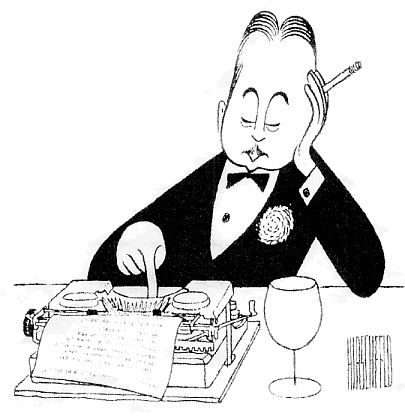a. “I can’t tell just how it happened; I think the beam fell on me.”
b. “Keep back; wait till I see if the coast is clear.”
c. “Ask the man next to you if he’ll let me see his programme.”
d. “Hark! What was that?”
e. “It’s too steep—he’ll never make it—oh, this is terrible!”
For the cheery evening’s reading, if you happen to be feeling low in your mind, let me recommend that section of “The Effective Speaking Voice” which deals with “the Subdued Range.” The selections for the practice-reading include the following well-known nuggets in lighter vein:
“The Wounded Soldier,” “The Death of Molly Cass,” “The Little Cripple’s Garden,” “The Burial of Little Nell,” “The Light of Other Days,” “The Baby is Dead,” “King David Mourns for Absalom,” and “The Days That Are No More.”
After all, a good laugh never does anyone any harm.
LIX—THOSE DANGEROUSLY DYNAMIC BRITISH GIRLS
It is difficult to get into Rose Macaulay’s “Dangerous Ages” once you discover that it is going to be about another one of those offensively healthy English families. Ever since “Mr. Britling” we have been deluged with accounts from overseas of whole droves of British brothers and sisters, mothers and fathers, grandfathers and grandmothers, who all get out at six in the morning and play hockey all over the place. Each has some strange, intimate name like “Bim,” or “Pleda,” or “Goots,” and you can never tell which are the brothers and which the sisters until they begin to have children along in the tenth or eleventh chapter.
In “Dangerous Ages” they swim. Dozens of them, all in the same family, go splashing in at once and persist in calling out health slogans to one another across the waves. There are Neville and Rodney and Gerda and Kay, and one or two very old ladies whose relationship to the rest of the clan is never very definitely established. Grandma, for some reason or other, doesn’t go in swimming that day, doubtless because she had already been in before breakfast and her suit wasn’t dry.
These dynamic British girls are always full of ruddy health and current information. They go about kidding each other on the second reading of the Home Rule bill or fooling in their girlish way about the chances of the Labor candidate in the coming Duncastershire elections. It is getting so that no novel of British life will be complete without somewhere in its pages a scene like the following:

